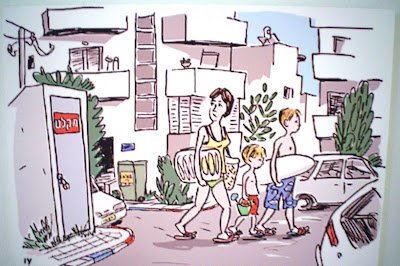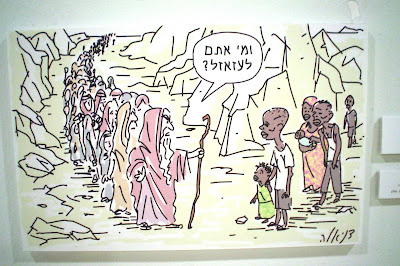I
just caught a lecture by Shmuel Rosner, former chief of news at Ha'aretz, as well as their Washington correspondent, and now a highly influential blogger at the J-Post. The lecture, which was co-sponsored by the Judaica collection of the Doe Library and the Berkeley journalism school, concerned media coverage of the Israeli-Palestinian, Israeli-Arab conflict. Rosner spoke from a lectern that has also belonged recently to Benny Morris, and the journalist at times struck the historian's muscular pose, affected the same contempt for naiveté and for leftist partisanship. I eagerly anticipated his views on Ha'aretz. He said the left-of-center daily is at times too critical of Israel, and may even have caused the IDF excessive pain. Rosner's goal was to describe the community of reporters and organizations covering Israel, and to brief us on how to discern bullshit. As for the Israeli media, those of us who rely on the Anglophone Israeli media are woefully out of touch with the internal political discourse in Israel. That discourse is created, he argued, on TV, and in the pages of Yediot, Maariv, and, now, Yisrael Hayom.
But the foreign media was the real focus.
The lecture was full of lists. The four cardinal sins of foreign journalists in the Middle East:
1. Obsession
2. Prejudice
3. Ignorance
4. Condescension
5. Unprofessionalism -- chiefly a matter of dereliction of fact-(re)-checking. (Not officially on the list, but something he lingered over later with regard to the unreliability of the Palestinian media, as well as the merely innocuous nature of the Swedish reporter who accused the IDF of harvesting Palestinian organs).
Rosner's rules for readers of foreign reporting:
1. What leaders say behind closed doors doesn't matter. What matters is what they say in public, to their own people, in their own language.
2. Israelis and Palestinians can't keep secrets. You will know what you want to know...eventually.
3. Commissions and reports of all types have little value.
4. Envoys of the US and other world powers are always too optimistic -- and almost bound to fail.
5. Do not overestimate the impact of the White House or other foreign intervention.
6. Just because someone doesn't speak English, it doesn't mean they're dumb.
7. Arabs generally have a lot of patience.
8. Never underestimate the power of domestic politics to dictate events.
9. Beware of predictions.
10. Beware of polls.
11. Beware of reporters with political biases.
12. There are many groups in the Middle East that hate each other, but they all agree on at least this: Americans are naive.
I found the scolding of foreign journalists quite satisfying. Rosner painted a vivid picture of what I imagined as a horde of professional gawkers gathering their luggage and translators at the carousel at Ben Gurion Airport, and then greedily speeding to as close to the scene of the carnage as they could get during the last two wars. And with print media downsizing everywhere, the correspondents are becoming ever less versed in the local cultures they cover. The result is a foreign media that covers Israel as a conflict, not as a country. Sounds problematic to me. We get the Israeli leadership's sound-bite, then the Palestinian's. Gazans are suffering these deprivations; now, look -- look how much it sucks to live in Sderot! The foreign media makes our heads swivel like the cat at the window watching the movements of birds outside. But what would the alternative be? What would covering Israel as a country really look like? I am not sure, and I wish I would have asked Rosner. To him, Israel as a country does have to be explained to (certain) Americans. Take his audiences at the American War College in Pennsylvania. Part of what is culturally idiosyncratic about Israel, Rosner explained to them, is the lack of distance between civil society and the military. "Everyone is a civilian, everyone is a soldier," said Rosner, unapologetically. But in fact, the image of Israel as a face-to-face society, where everyone knows someone who is affected by war, the rigors of the occupation, terrorism should be very familiar to readers of, say, the New York Times. This may be the way Israel really is, but it's also something that Israelis desperately want us outsiders to know. I find that very interesting.
A face-to-face society with 5 million cell phones, boasted Rosner, offers the determined journalist an almost unique opportunity to recover the truth about complex events. His paradigmatic example was the so-called massacre of Jenin in 2002. How did his team at Ha’aretz debunk the rumors of a massacre? By calling the soldiers, particularly reservists, they knew. “They couldn’t all be lying,” claimed Rosner. These informants were the “cousins’ best friends" of Rosner’s news division. Social proximity for him is a comparative advantage over foreign media in terms of access, not a journalistic liability. The fog of war was lifted, a little too effortlessly. On the other hand, Rosner insisted on the incompatability of perceptions born of different cultural contexts. Shimon Peres, so his opening joke went, isn’t the same Shimon Peres at home as abroad. Here, I thought Rosner combined not-so-satisfactorily a post-modern uncertainty about what we can really know with great faith in the capacity of the critical reader or journalist to get to the bottom of things. American journalistic pretension to objectivity almost sounded like the American naiveté he seizes upon. But his epistemology is certainly practical. There are things we can know (the Jenin massacre didn’t happen), and things we can’t (what happened to Muhammed al-Durrah).
Granted the last question, I asked about my personal cause celèbre: archaeology in East Jerusalem driven by vulgar ideology. I offered myself up as the guinea pig here. It's an Israeli media story that, for me, is opaque. I read about it in English in Ha'aretz and on the website of the Israeli Antiquities Authority. But I can't seem to figure it out. Are all the projects undertaken in the Ir David legal or illegal (under Israeli, not international law)? Was there a "cultural context" that Rosner could provide that would explain the seemingly contradictory reports? Rosner's answer, and he must have been fatigued at this point, was to draw again a distinction, however provisory, between the forces of objectivity and those of subjectivity. There are the "objective" archaeologists, and there are the ideologically driven right-wing zealots who fund and support the dubious excavations. At this point, Rosner could have taken a line from the Berkeley-version of Benny Morris, who, when an audience member complained that a faulty microphone rendered his lecture inaudible, explained bluntly, "This is the situation." In the final analysis, Rosner admitted, we have to trust someone. "I trust reporters, not newspapers," he said, naming a few of his favorite colleagues' names. Indeed, this is the situation. I agree.

















.jpg)



















